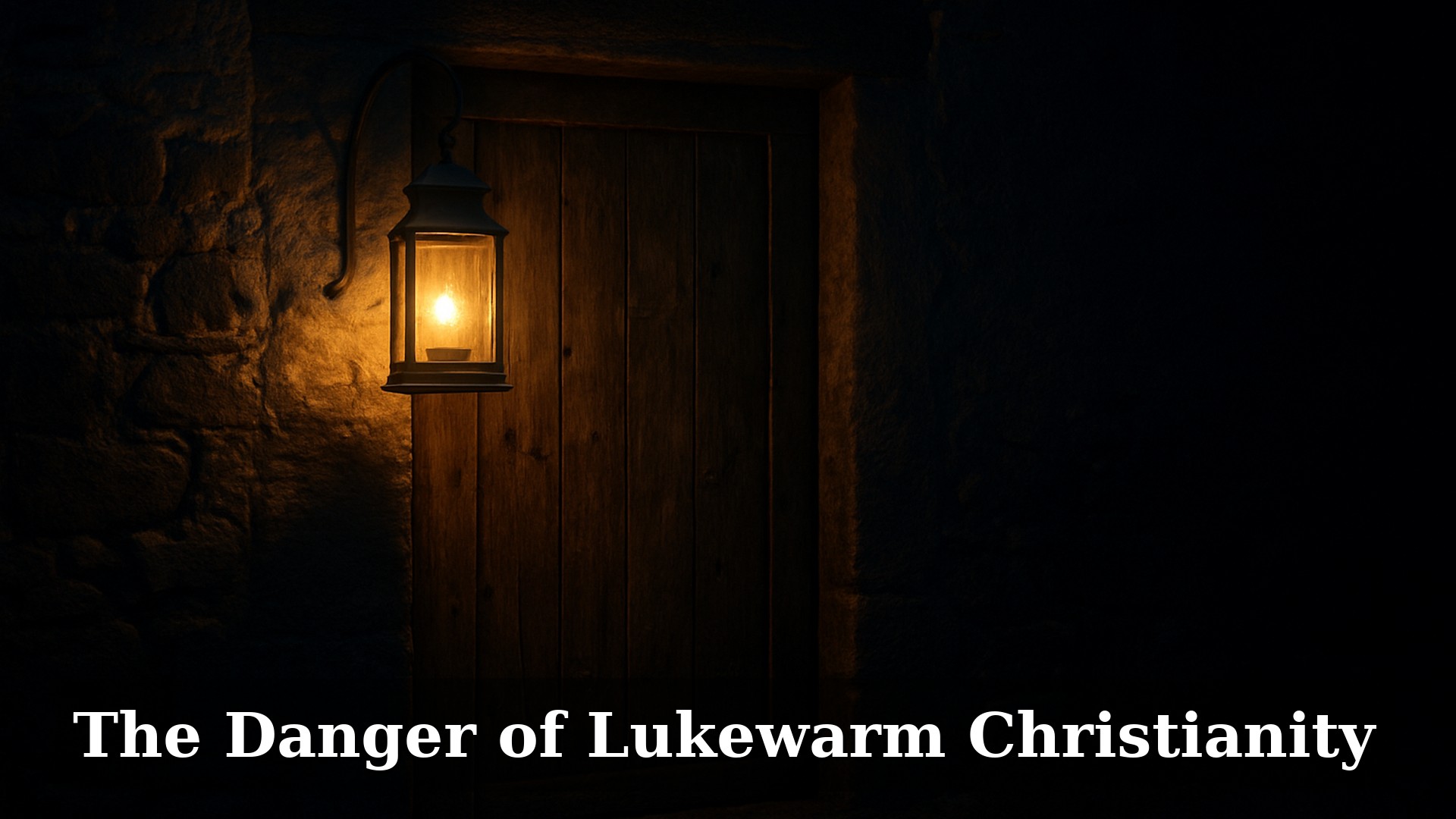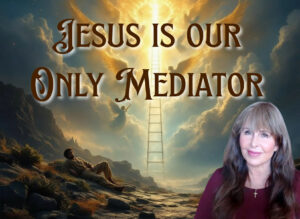⏱️ Estimated Reading Time: 14 min read
The Danger of Lukewarm Christianity
Question: What is a lukewarm Christian?
The term “lukewarm Christian” is often used in sermons and conversations, but what does it actually mean? Is it simply someone who isn’t excited about their faith, or does Scripture give a more serious warning?
To answer this faithfully, we turn to the words of Jesus in Revelation 3:14–22, where He rebukes the church in Laodicea for being “neither cold nor hot.” Here, lukewarmness isn’t mild disinterest—it’s spiritual self-deception and danger.
Historical Context: Laodicea in the First Century
- Setting & date: Revelation addressed seven churches in Roman Asia and is commonly dated to the late first century (c. AD 95). John writes to Laodicea, part of the Lycus Valley triad with Hierapolis and Colossae.
- Wealth & self-sufficiency: Laodicea sat on major trade routes and was known for commerce and banking. After a devastating earthquake (AD 60/61), the city famously rebuilt without imperial aid—echoing, “I am rich… and need nothing” (Rev. 3:17).
- Textiles vs. “white garments” (v. 18): The city was renowned for its fine, glossy black wool. Jesus’ counsel to “wear white garments” forms a pointed contrast to their proud textile trade.
- Medical school & “eye salve” (v. 18): The region was noted for medical treatments, including an eye ointment known as Phrygian powder. Jesus uses that local image to call for true spiritual sight.
- Water & the “lukewarm” image (vv. 15–16): Nearby Hierapolis was famous for hot mineral springs and Colossae for cold springs; Laodicea’s water arrived tepid and unpalatable. Jesus applies the image to their works and spiritual state—neither refreshingly “cold” nor therapeutically “hot.”
Interpreting the Seven Letters Today
Here in Laodicea Christians whose material affluence left them little zeal for Christ and his gospel. Likewise, the evangelical church in the West today is focused largely on self—with worship experiences designed to make us feel good and messages geared toward self-improvement—with little apparent interest in Christ. John Stott comments: “Perhaps none of the seven letters is more appropriate to the church at the beginning of the twenty-first century than this. It describes vividly the respectable, nominal, rather sentimental, skin-deep religiosity which is so widespread among us today.”
Christ’s Disgusted Assessment
Laodicea was the last of the seven churches to which Jesus sent messages through the apostle John. It was one of three churches located in the Lycus valley, together with Colosse and Hierapolis, about a hundred miles east of Ephesus. These churches had been founded forty years earlier, during the apostle Paul’s stay in Ephesus, probably by Epaphras, whom Paul praises in Colossians 4:13 for his work there.
Laodicea was situated along a major trade route, which is why it was a wealthy city, home to bankers, financiers, and millionaires. The city was destroyed in the great earthquake of A.D. 61, but was so wealthy that it declined government help for its rebuilding. Laodicea was home to a school of medicine that was famed for its salves, including one for eye ailments. It was further noted for the soft, raven-black wool of its sheep, in which its fashionable elites were usually dressed.
Laodicea had one main problem: it lacked a good water supply. Nearby Hierapolis had medicinal hot springs, and Colosse was blessed with a source of pure, cold water. Laodicea had to bring its water by an aqueduct from hot springs five miles away. The problem was that the water arrived tepid and brackish. Jesus picked up on this issue in writing to the Laodicean church: “I know your works: you are neither cold nor hot. Would that you were either cold or hot!” (Rev. 3:15).
The problem that Jesus notes in Laodicea was not persecution, gross sin, or false teaching. In terms of its circumstances, it seems, Laodicea was singularly blessed. For this reason, however, the people had lost their zeal for Christ. It was a spiritually apathetic church. The people gathered for worship, but they came like those today who look more frequently to their watches than to the Bible. They probably believed the right things, but those truths did not affect them deeply. When it came to Jesus, they were believers, but only lukewarmly so.
In addition to a lack of personal fervor for Christ and his Word, it is likely that the Laodicean church could show little work or witness. Jesus states, “I know your works,” but then does not cite any worth mentioning. The people were probably timid in their witness, unmotivated about prayer, indifferent to the sick and imprisoned, and self-centered in their hoarding of money. They were the kind of people who believed that one should not be “fanatical” about religion, but in reality lacked the wholeheartedness that alone pleases the Lord.
Jesus’ response to this lukewarm religion was to express disgust: “So, because you are lukewarm, and neither hot nor cold, I will spit you out of my mouth” (Rev. 3:16). Some commentators are distressed that Jesus would prefer coldness to a lukewarm faith. The reason, however, is not hard to fathom. It is perhaps most offensive of all for people to affirm the glories of Christ but then to live as though they meant little. Stott writes: “If he is the Son of God who became a human being, died for our sins, and was raised from death; if Christmas Day, Good Friday, and Easter Day are more than meaningless anniversaries, then nothing less than our wholehearted commitment to Christ will do.”
The church does not always approve the enthusiasm of a man such as John Wesley, who went into the fields preaching the gospel, but Christ does. The church may urge a man such as William Carey to shrink back from “wasting” his life among the heathens of India, but Christ was delighted and displayed his glory in the success of that gospel mission. Carey’s motto, “attempt great things for God; expect great things from God” was the very antithesis of the Laodicean malaise.
How did the Laodiceans become so lukewarm? Jesus answers that they had come to a false estimation of themselves on the basis of their outward blessings: “For you say, I am rich, I have prospered, and I need nothing, not realizing that you are wretched, pitiable, poor, blind, and naked” (Rev. 3:17). The Laodiceans looked on their favorable circumstances and considered their riches as true wealth. In fact, Jesus observes that by trusting in money and living for the things of a dying world, they were wretched, pitiable, blind, and covered with shame. Anne Soukhanov has labeled this syndrome, so common in contemporary America, as “Affluenza.” She defines it as “an array of psychological maladies such as isolation, boredom, passivity and lack of motivation engendered in adults, teenagers, and children by the possession of great wealth.” The Laodiceans, like so many churches in America today, had become sick from “Affluenza,” and Jesus had become sick of them in return.
The problem was not their wealth but what their riches had done to them. Many great believers have been wealthy, such as Abraham in the Bible and such as Robert Haldane, who used his money to support a great revival in Geneva. The question is whether we hold our wealth as a stewardship from God, to be used for his glory, the good of others, and the work of the gospel. Or does wealth cause us to stop thinking about Christ’s kingdom, instead musing on earthly blessings? This was the issue in Laodicea, where God’s people boasted in their hearts and largely forgot about God and the kingdom of Christ.
Notice from this passage that Christians tend to estimate themselves wrongly. This is one reason why we so greatly need sound and clear teaching from the Bible, which alone will present a true portrait and convict us of our weakness and sin. The Bible tells us, “God opposes the proud but gives grace to the humble” (1 Peter 5:5). We therefore need messages such as the one to Laodicea to realize the trend of our lives and to make changes while there is still time. We need to see the truth about our corruption in sin, our toleration of false teaching, our partnership in idolatry, and our self-absorbed indifference to Christ in order to avoid wasting our lives and even disgusting our Lord.
Second, notice that the Laodiceans drew their attitude from the secular culture around them. This happens frequently to Christians. In a sophisticated culture, Christians take on airs of superiority. In a patriotic setting, we become preoccupied with earthly kingdoms. Among pleasure-seekers, Christians live for the sake of the latest consumer goods. The rich arrogance of Laodicea had infected the believers’ attitudes, making them spiritually poor, blind as to heavenly realities, and disgraced by a shameful absence of good works and a faithful witness. Christians should therefore be on guard against adopting the spirit of the age and of the place where we live, instead cultivating a biblical ethos and the agenda of Jesus Christ. If we do not, the danger is so great that Jesus said he would spit the Laodicean church out of his mouth. Undoubtedly, this indicates that many in that church were not even saved. Apathetic Christianity often masks a spiritually dead unbelief. In his parable of the talents, Jesus ordered that such false professors of faith be cast “into the outer darkness. In that place there will be weeping and gnashing of teeth” (Matt. 25:30).
Christ’s Loving Counsel
Christ’s letter to Laodicea is one of the harsher portions of Holy Scripture, and we may therefore be surprised to see the tenderness and love that Christ shows to this church. We conclude Revelation 3:17, expecting Jesus at any moment to spew out this congregation from his disgusted mouth. Instead, Jesus ministers, saying, “Those whom I love, I reprove and discipline” (3:19). Here is hope in light of our many failings and sins: Christ’s love for his church. “For all their failures, this is nevertheless a church composed of his people whom he loves and whom he wants to bring to repentance.” It is not surprising, then, that the remedy for the Laodicean malaise comes from Jesus himself: “I counsel you to buy from me gold refined by fire, so that you may be rich, and white garments so that you may clothe yourself and the shame of your nakedness may not be seen, and salve to anoint your eyes, so that you may see” (3:18).
Before considering the particular items noted by Jesus, we should focus on the general theme of his counsel. The Christians were to stop expecting their spiritual needs to be met from the Laodicean marketplace and were instead to come to Christ and do business with him. One thing they would find is that Jesus runs a completely different economy from that of the world. This is what Jesus meant in saying that we should “buy from” him: not that his saving blessings are up for sale, but that we should come to him for the divine blessings that will save our souls. He alone can enrich our poverty, clothe our nakedness, heal our blindness, and give life to the spiritually dead. No doubt Jesus had in mind the market economics expressed by Isaiah: “Come, everyone who thirsts, come to the waters; and he who has no money, come, buy and eat! Come, buy wine and milk without money and without price” (Isa. 55:1). To trade with Jesus is to come to him empty-handed, seeking saving blessings by his grace alone. Augustus Toplady put it well:
Nothing in my hand I bring, simply to thy cross I cling;
Naked, come to thee for dress; helpless, look to thee for grace;
Foul, I to the Fountain fly; wash me, Savior, or I die.
First, Jesus encouraged them to “buy from me gold refined by fire” (Rev. 3:18). He was referring to the true riches of salvation and a godly life… to be “rich toward God” (Luke 12:21). Many wealthy people are pitiable in their misery and despair, while strong believers who are poor in the things of the world are rich in “righteousness and peace and joy in the Holy Spirit” (Rom. 14:17).
Second, Jesus urges his readers to gain “white garments so that you may clothe yourself and the shame of your nakedness may not be seen” (Rev. 3:18). Throughout Revelation, white garments symbolize those who are justified through faith in Christ and have confirmed their salvation by persevering to the end (3:4; 4:4; 7:9; 22:14). The Christians in white were to be a public counterculture displaying the righteousness of Christ and the hope of resurrection life.
Third, Laodicea was known for its medicinal eye salves, but that did not keep the church from becoming spiritually blind. Therefore, the people should come to Jesus for “salve to anoint your eyes, so that you may see” (Rev. 3:18). With the psalmist: “Open my eyes, that I may behold wondrous things out of your law” (Ps. 119:18).
All these gifts are freely given by Jesus, yet he wants something out of this transaction, as Lord: “Those whom I love, I reprove and discipline, so be zealous and repent” (Rev. 3:19). The word zealous means to be “boiling hot” (Greek, zelóō). Since we have received everything by grace through his blood, he desires that we would give ourselves wholly in response (Rom. 12:1).
Christ’s Tender Appeal
“Behold, I stand at the door and knock…” (Rev. 3:20). This verse is frequently seen as an evangelistic appeal, but the context shows Jesus is speaking to his church that has shut him out. As James Boice explains, Christ “is knocking at the closed hearts of those who are his but who have turned their backs on him… calling drifting, worldly believers to sincere repentance and renewal.”
Holman Hunt’s painting Light of the World depicts Christ at a door without a handle meant to be opened from the inside. This challenges the church and each believer—“if anyone” to open to the presence, rule, and blessing of Christ. We must hear his voice (the Word) and open in repentant obedience.
Jesus promises, “I will come in to him and eat with him, and he with me” (Rev. 3:20) an offer of rich communion. While not limited to the Lord’s Supper, a church that opens to the living Christ through his Word will enjoy deep blessings at his Table and in daily discipleship.
Christ’s Salvation Offer
Christ rebukes a lukewarm church to stir repentance and zeal. He warns that such a church may be spat out—implying many are unconverted—yet offers true riches, white robes, and seeing eyes. Most of all, he offers himself. He identifies as “the Amen, the faithful and true witness, the beginning of God’s creation” (Rev. 3:14)—the Lord whose word stands, whose testimony is life, and who reigns as head over all creation (cf. John 1:1–3).
His climactic promise: “The one who conquers, I will grant him to sit with me on my throne, as I also conquered and sat down with my Father on his throne” (Rev. 3:21). Leon Morris notes that Christ overcame by the cross, setting the pattern for his followers. What looked like defeat was victory. So we conquer by faith (1 John 5:4), sustained by his power, unto communion with him in glory.
Seeing Christ’s gracious offer to Laodicea, we readily identify with this church—often judged the worst of the seven—because the offer is sheer grace. As Joseph Hart’s hymn invites: “Come, ye sinners, poor and wretched… Without money… Come to Jesus Christ and buy.”
Conclusion: Lukewarmness Demands a Response
Jesus doesn’t just rebuke the lukewarm; He invites them to return: “If anyone hears My voice and opens the door, I will come in…” (Rev. 3:20). The remedy for lukewarm Christianity is repentance, renewed love for Christ, and commitment to His Word, His Church, and His mission.
“Do not be slothful in zeal, be fervent in spirit, serve the Lord.” (Romans 12:11)
For more from Contending for the Word Q&A please visit us at Servants of Grace or at our YouTube.
Dave Jenkins is happily married to his wife, Sarah. He is a writer, editor, and speaker living in beautiful Southern Oregon. Dave is a lover of Christ, His people, the Church, and sound theology. He serves as the Executive Director of Servants of Grace Ministries, the Executive Editor of Theology for Life Magazine, the Host and Producer of Equipping You in Grace Podcast, and is a contributor to and producer of Contending for the Word. He is the author of The Word Explored: The Problem of Biblical Illiteracy and What To Do About It (House to House, 2021), The Word Matters: Defending Biblical Authority Against the Spirit of the Age (G3 Press, 2022), and Contentment: The Journey of a Lifetime (Theology for Life, 2024). You can find him on Facebook, Twitter, Instagram, Youtube, or read his newsletter. Dave loves to spend time with his wife, going to movies, eating at a nice restaurant, or going out for a round of golf with a good friend. He is also a voracious reader, in particular of Reformed theology, and the Puritans. You will often find him when he’s not busy with ministry reading a pile of the latest books from a wide variety of Christian publishers. Dave received his M.A.R. and M.Div through Liberty Baptist Theological Seminary.




